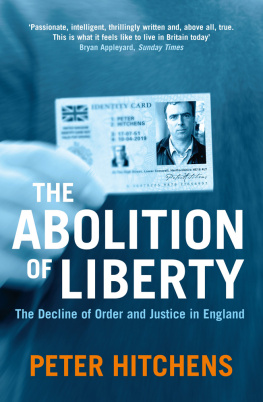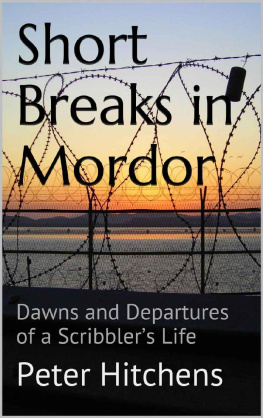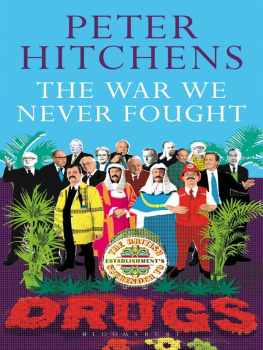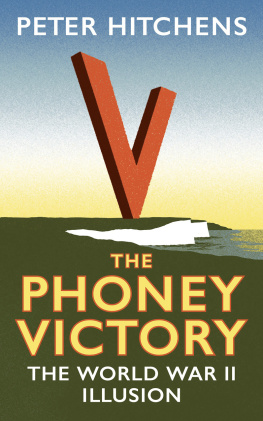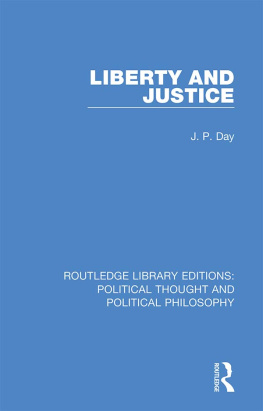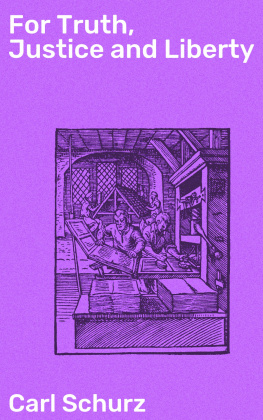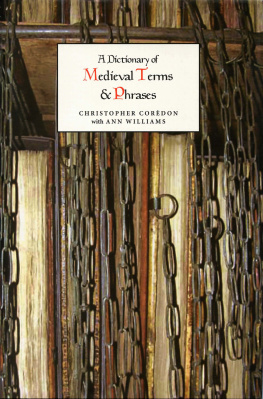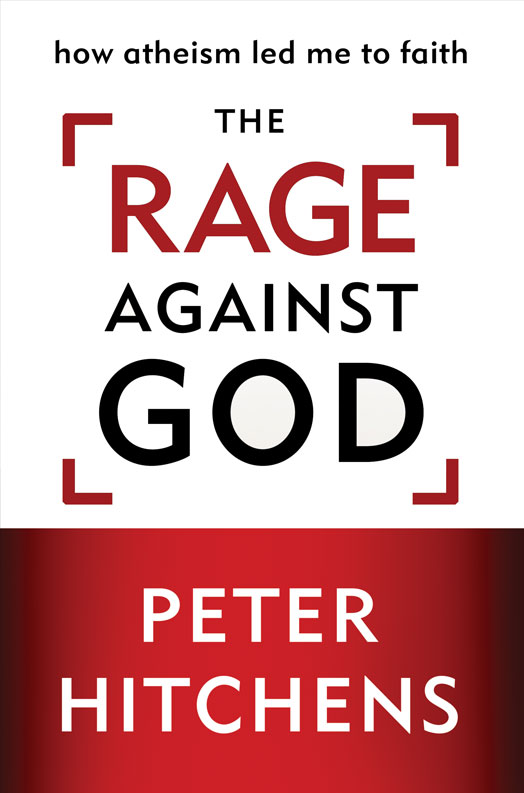Peter Hitchens - The Abolition of Liberty: The Decline of Order and Justice in England
Here you can read online Peter Hitchens - The Abolition of Liberty: The Decline of Order and Justice in England full text of the book (entire story) in english for free. Download pdf and epub, get meaning, cover and reviews about this ebook. year: 2004, publisher: Atlantic Books, genre: Politics. Description of the work, (preface) as well as reviews are available. Best literature library LitArk.com created for fans of good reading and offers a wide selection of genres:
Romance novel
Science fiction
Adventure
Detective
Science
History
Home and family
Prose
Art
Politics
Computer
Non-fiction
Religion
Business
Children
Humor
Choose a favorite category and find really read worthwhile books. Enjoy immersion in the world of imagination, feel the emotions of the characters or learn something new for yourself, make an fascinating discovery.
- Book:The Abolition of Liberty: The Decline of Order and Justice in England
- Author:
- Publisher:Atlantic Books
- Genre:
- Year:2004
- Rating:3 / 5
- Favourites:Add to favourites
- Your mark:
- 60
- 1
- 2
- 3
- 4
- 5
The Abolition of Liberty: The Decline of Order and Justice in England: summary, description and annotation
We offer to read an annotation, description, summary or preface (depends on what the author of the book "The Abolition of Liberty: The Decline of Order and Justice in England" wrote himself). If you haven't found the necessary information about the book — write in the comments, we will try to find it.
The Abolition of Liberty: The Decline of Order and Justice in England — read online for free the complete book (whole text) full work
Below is the text of the book, divided by pages. System saving the place of the last page read, allows you to conveniently read the book "The Abolition of Liberty: The Decline of Order and Justice in England" online for free, without having to search again every time where you left off. Put a bookmark, and you can go to the page where you finished reading at any time.
Font size:
Interval:
Bookmark:

About the Author
PETER HITCHENS is a well-known and controversial commentator, a columnist for the Mail on Sunday and a frequent broadcaster. His first book, The Abolition of Britain, made an impact on both Left and Right with its argument that Britain had chosen the wrong future in the 1960s, and that Thatcherism had not only failed to halt the moral and cultural revolution launched by the Left, but had in many ways accelerated it.
The Abolition of Liberty
Peter Hitchens

ATLANTIC BOOKS
London
Copyright page
Originally published in Great Britain as A Brief History of Crime in 2003 by Atlantic Books, an imprint of Grove Atlantic Ltd.
This revised and updated edition published in 2004.
Copyright Peter Hitchens 2003
The moral right of Peter Hitchens to be identified as the author of this work has been asserted in accordance with the Copyright, Designs and Patents Act of 1988.
The author and publisher wish to thank the following for permission to quote from copyrighted material: David Higham Associates for Chronicles of Wasted Time by Malcolm Muggeridge (1979); Simon & Schuster for The Closing of the American Mind by Allan Bloom (1987).
All rights reserved. No part of this publication may be reproduced, stored in a retrieval system, or transmitted in any form or by any means, electronic, mechanical, photocopying, recording, or otherwise, without the prior permission of both the copyright owner and the above publisher of this book.
1 2 3 4 5 6 7 8 9
A CIP catalogue record for this book is available from the British Library.
Paperback ISBN 978 1 84354 149 3
E-book ISBN 978 1 78239 773 1
Printed in Great Britain by Mackays of Chatham
Atlantic Books
An imprint of Atlantic Books Ltd
Ormond House
2627 Boswell Street
London WC1N 3JZ
www.atlantic-books.co.uk
Dedication
To my parents
Epigraphs
Society cannot exist unless a controlling power upon will and appetite be placed somewhere, and the less there is within, the more there must be without.
Edmund Burke
There are more instances of the abridgment of the freedom of the people by gradual and silent encroachments of those in power than by violent and sudden usurpation.
James Madison
Contents
Preface
Jonathan Swift said that you could not reason a man out of a position that he had not been reasoned into in the first place. That is why I have, with some sadness, ripped two chapters out of this book, originally published in April 2003 as A Brief History of Crime . In truth, I ought to have known better in the first place. As I wrote that book, originally meant to explain what had gone wrong with the English criminal justice system, it became clear to me that I had stumbled on to a much bigger subject. The more I researched, the more it seemed to me that there was a threat to the liberty of the English and British people, emanating from their own trusted government. This threat was gathering and increasing, largely unnoticed, and it faced no serious opposition. It was even more important than the issue of unchecked crime and disorder, though linked to it.
I am convinced that the only way to affect politics in this country is to influence the left. As I described in my 1999 book The Abolition of Britain , the left now holds power in almost all the important cultural and moral citadels of the country, as well as in government. I do not believe that all its supporters intended many of the bad results which their policies have had. I continue to hope that, if I can persuade them that those results truly are caused by their ideas, they may change their minds as I have done. Any political book which does not reach the left might as well not have been written. Influencing the counsels of the Tory Party is about as much use in British politics as gaining the favour of the Habsburgs would be in present-day Continental diplomacy. In any case, the Tory Party is, if anything, even more hostile to my sort of thinking than is the Labour Party. In its declining years it has become far too ready to reach for the false solutions of pseudo-conservatism, at home and abroad unrestrained market forces and confrontations with foreign bogeymen. It is afraid to be genuinely conservative, and almost entirely closed to original or unconventional ideas. It is considered brave for Conservatives to adopt the dreariest and most played-out policies of the Fabian mainstream, but it is foolhardy for them to say or think anything genuinely reactionary. The Conservative Party is actually more likely than any other political force to pronounce the cliches You cant put the clock back, or Change is inevitable. The arrival of Michael Howard as Tory leader diminishes any chance that it will make a serious effort to defend liberty, since Mr Howard is personally associated with past attempts to undermine jury trial, reduce the rights of the accused person, and to reintroduce identity cards.
So I should have realized that it was foolish to make it so hard for the left to listen to my arguments. This is not to say that I withdraw anything I said in A Brief History of Crime . I remain convinced that the moral, logical and practical case for the death penalty is excellent and irrefutable. Likewise, I am sure that arguments for gun control are empty and that it has proved worthless in practice, judged on its own terms. However, opposition to capital punishment and a passion for gun control are articles of faith with the modern left. Facts and logic have no part to play in these opinions. In general, the stronger and better the arguments against these two positions, the angrier the response will be. People do not like to be made to think about their faith, in fact they positively resent attempts to make them do so.
That is why I have removed these chapters from this edition. For on the other issues which I deal with here, the left has not made up its mind with anything like the same determination, nor with the same emotional, irrational conviction. Its more intelligent supporters recognize that crime and disorder fall most painfully on the poor. Some of them may even concede that the current state of our prisons is atrociously cruel, and I agree with them that these places lack any purpose or justification as they stand. The idea that the police are best employed patrolling the streets on foot is gaining in strength and supporters all the time, and I like to think that I have played some part in this important change of mood. Those who know what drugs have done and are doing to the English poor and unemployed must also have doubts about the glib defeatism of the London establishment on this subject. My re-examination of the Scarman and Macpherson reports must at least be of interest to anyone who hopes for racial harmony in this country, an objective shared by all civilized people.
But when we come to the attack on jury trial and the other protections of liberty, the danger is so great that even the most unlikely allies must join together to fight it. And now that the British government is stealthily preparing the introduction of identity cards, it is essential that all those who oppose this slippery, dishonestly-presented and fundamentally nasty project link arms to stop it. It was successfully beaten in Australia, where it was initially as popular as it is now in Britain. It can be defeated here as well, and perhaps such a defeat will bring about a rebirth of the old English mistrust of authority and instinctive love of liberty and private life. This is why I have added a chapter devoted to this topic, which explains its historical origins and sets out the many reasons why its alleged benefits are illusory, while its implicit threat to freedom is undeniable. If you have done nothing wrong and have nothing to hide, even so you have much to fear from this damned card.
Font size:
Interval:
Bookmark:
Similar books «The Abolition of Liberty: The Decline of Order and Justice in England»
Look at similar books to The Abolition of Liberty: The Decline of Order and Justice in England. We have selected literature similar in name and meaning in the hope of providing readers with more options to find new, interesting, not yet read works.
Discussion, reviews of the book The Abolition of Liberty: The Decline of Order and Justice in England and just readers' own opinions. Leave your comments, write what you think about the work, its meaning or the main characters. Specify what exactly you liked and what you didn't like, and why you think so.

